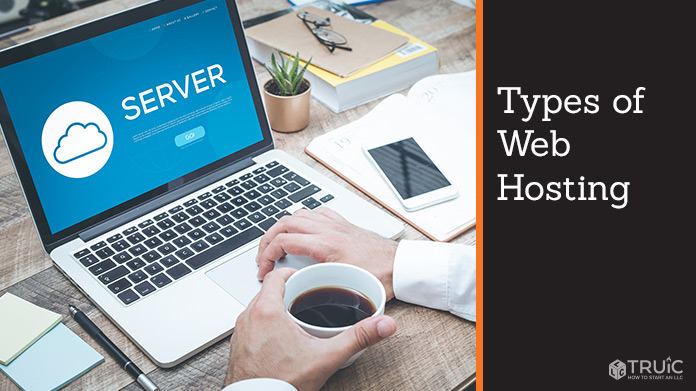Types of Web Hosting: A Guide to Different Web Hosting Options
Website hosts play a crucial role in making sure your business’ website is available and lightning-fast. All web hosts offer different types of web hosting packages, which can overwhelm new site owners. The best thing you can do is to learn what types of services are available. Then, you can go about selecting the right option for your business.
To help you make an informed decision, this guide outlines the different types of web hosting, how they work, their pros and cons, and which businesses they suit best.
Recommended: After extensive research we suggest using GoDaddy for your web hosting and domain needs.

Web Hosting’s Role
The main role of a web hosting service is to provide a storage place for your business website. But, different types of web hosting services vary in their storage capacity, server speed, and reliability as well as how much control you have and how much technical knowledge you need.
Behind every website you’ll find computer programming code stored in various files. For internet users to access those files, you need to house them somewhere. That’s where web hosting providers come in.
These providers store your website’s files on their servers, which people can access through their web browsers. A server acts like a computer, but with far more power so many people can access its data simultaneously.
Many web hosting providers also offer additional services, such as server management, website building and backup, and security screening.
Want to find the right web host for your business website? Check out our Best Web Hosting Providers Review.
Best Web Hosting Providers
 |
Best Web Hosting Companies |
|---|---|
Bluehost 4.7/5 |
BEST WEB HOST OVERALL
|
GoDaddy 4.7/5 |
BEST VARIETY OF FEATURES
|
Kinsta 4.5/5 |
|
HostGator 4.4/5 |
|
Web.com 4.2/5 |
|
The 6 Main Types of Web Hosting
Web hosting services come in six main types:
- Shared hosting
- Virtual private server (VPS) hosting
- Dedicated hosting
- Cloud hosting
- Managed hosting
- Colocation hosting
To decide which will best meet your needs, you must understand the services each type offers, how much technical support you can provide for your website, and how much you can afford to pay for this service. Here’s an overview of each type.
1. Shared Hosting
Shared hosting services make an ideal choice for beginners and websites with low traffic volumes. It starts at a lower cost than most other types of hosting and often comes with some type of customer service should you ever need it.
How It Works
Your website shares space with other websites on the shared hosting provider’s server. Because a server can house thousands of sites, shared hosting is much cheaper than other types of web hosting.
While each server is powerful, all the websites it stores must share its resources. This includes its random-access memory (RAM), central processing unit (CPU) speed, and hard drive space. Depending on the traffic a server receives, it may experience a strain on its resources while responding to data requests from visitors on each website it hosts.
The Pros and Cons
Shared hosting offers several benefits, here's a list of some of the best features:
- Low Cost: Having shared hosting is incredibly affordable and great for business owners on a budget.
- Technical Support: Your hosting provider will take responsibility for any service needed and can help with any technical issues.
- Customer Service: With access to expert support, even a complete beginner can have a website that looks like a pro.
But, shared hosting also comes with a few drawbacks. Here's some of the cons:
- Slow Uptime: Shared hosting can cause your website to load rather slow, which is bad for user experience and search engine optimization (SEO).
- Lack of Control: When you choose shared hosting, you have no control over the type of software, hardware, and other technical equipment the host uses.
Which Businesses Does It Suit Best?
If you don’t expect your website to receive a high volume of traffic, shared hosting can offer an ideal place to start. Once your site traffic increases, you may want to consider another option.
Many businesses also choose shared hosting if they want others to manage their website or if they’re still in the development process.
Depending on the plan you choose, shared hosting also can prove very affordable for new or small businesses on a tight budget.
Recommended: We at TRUiC think that GoDaddy has some of the best shared hosting options for beginners. Get a free domain for the first year when you sign up for GoDaddy shared hosting.
2. VPS Hosting
VPS hosting represents an upgrade for business owners who want more control over the server that houses their website, but don’t have the need or experience for a dedicated server. Besides offering more options, VPS hosting also provides a cost-effective service.
How It Works
While your website will still share a server with other sites when you choose VPS hosting, the provider will allocate your website its own bandwidth, disk space, and operating system.
The provider makes this allocation via the hypervisor of its virtual machine monitor. A hypervisor is a piece of software that runs on the host server and allows multiple virtual machines to operate on the same server. Known as “guest” machines, they each get an equal, allocated share of the hypervisor’s dedicated CPU speed, RAM, and hard disk drive (HDD) capacity.
The Pros and Cons
There are several main advantages of VPS hosting:
- Low Cost: Even though it may be a bit more than shared hosting, VPS hosting still costs less than a dedicated server.
- Flexibility: Get set up quickly and make configurations that won’t affect others on the VPS server.
- Speed: Because you’re the only user, other sites can’t impact your website’s speed or resource limit.
- Scalability: If you need more resources, you can request them from your provider who can typically deliver them within minutes.
- Support: As with shared hosting, you also have access to technical support from the web host.
There's really only one major drawback to VPS hosting:
- Lack of Autonomy: Having a dedicated server offers you complete control over your site and content, a VPS server cannot guarantee this.
Which Businesses Does It Suit Best?
Some VPS hosting packages can cost the same as shared hosting plans. That means even businesses with a small budget can afford to upgrade to VPS hosting.
Companies that need more space and computing power do pay more, but the cost is worth it because their websites will never suffer from downtime and slow loading speeds.
Learn more about what VPS hosting can offer you by checking out our GoDaddy VPS Hosting Review.
3. Dedicated Hosting
Dedicated hosting ensures you have your own resources because you don’t share a server with anyone else. It comes in two versions: managed and unmanaged dedicated hosting.
How It Works
With unmanaged dedicated hosting, you have the maximum level of control, flexibility, and power because the server is yours. If you have a problematic website or faulty coding, you have no one to blame.
Because only you have access to your dedicated server, you’re responsible for its administration, operations, and security. This may require you to employ someone who can manage your server if you lack the technical know-how.
In contrast, managed dedicated hosting allows you a certain degree of server customization while the hosting provider takes responsibility for operating and maintaining your server. You also may choose the type of RAM, operating system, and other hardware with this version of dedicated hosting.
The Pros and Cons
Dedicated hosting comes with one main benefit:
- Control: You can choose the software applications and tools on your server. This ensures you have a fast website that meets your specific business needs.
While both versions of dedicated hosting allow you to customize your server and its security, they also come with a few drawbacks:
- Expensive: The costs will increase quite a bit with dedicated hosting.
- Time: It also takes more time to install a dedicated server.
- Technical Knowledge: You'll need to have the technical expertise for the ongoing management of your own server.
A server administrator can help with many of the ongoing maintenance tasks associated with a dedicated server. But, if you experience a hardware issue, it may take some time for you to realize it and for your dedicated hosting provider to fix the issue.
Which Businesses Does It Suit Best?
Businesses that need specialized hardware or have to protect a huge amount of data typically turn to dedicated hosting. Most businesses with high-traffic websites, but no need for the extra security of a dedicated server prefer cloud hosting.
If you still need a reliable hosting service, we recommend you check out our GoDaddy Web Hosting Pricing and Plans guide to see if GoDaddy is the hosting service for your small business.
4. Cloud Hosting
Cloud hosting, which involves the pooling of computing resources, supports a website using multiple machines. With cloud hosting, it doesn’t matter how many other websites use the hosting provider’s resources. Its huge network of servers can deliver uninterrupted web hosting.
How It Works
With all the other services that web hosting providers offer, you can draw only so much RAM and use only as much space as they allocate to you.
Cloud hosting has no such restrictions because these providers have a massive network of servers that they combine into a giant virtual machine. By splitting that giant virtual machine into multiple, smaller machines, they can offer unlimited scalability for hosted websites.
The Pros and Cons
Cloud hosting comes with qutie a bit of useful features:
- No Resource Restrictions: You don't have to share your bandwidth with others.
- Price: You only pay for what you need.
- Stability: Cloud hosting ensures your site will remain online even if one server within the network goes offline.
- Protection: Cloud hosting is efficient in protecting your site from distributed denial of service (DDoS) attacks.
There is only one major drawback of cloud hosting:
- Lack of Control: You won’t have full control of your data with cloud hosting.
Which Businesses Does It Suit Best?
Cloud hosting offers easier maintenance and less work, making it a great option for all business websites — especially those that need unlimited scalability.
5. Managed Hosting
Managed hosting combines web hosting with other services. GoDaddy is a good example of a managed hosting provider.
How It Works
In managed hosting, the provider manages the technical side of your website to keep it running smoothly without any issues. Specifically, managed hosting providers manage improvements to page-loading speeds, security, scalability, daily site backups, and software and hardware updates.
The Pros and Cons
With managed hosting there's quite a bit of benefits:
- Website Support: Managed hosting servers not only help you host your website, most often they include website building software too.
- Protection: Managed hosting providers also scan their customers’ sites constantly for any malware or hacking attempts.
- Automatic Updates: Having managed hosting means never having to worry about manual updates or backups, they'll handle it for you.
In terms of drawbacks, managed hosting only has a few:
- Price: This will cost a bit more than shared hosting even though your website still shares server space with other sites.
- Limited Features: You’ll only have access to plugins and tools offered by the provider.
Which Businesses Does It Suit Best?
Managed hosting works best for bloggers. It also can provide an ideal solution for freelancers and small business owners who don’t know much about managing the technical side of a website.
While managed hosting comes with limited flexibility and a slightly higher cost than shared hosting, it does offer worry-free website hosting. With this option, you’ll never have to deal with updates or issues related to site security, speed, and uptime.
Want to learn more about managed hosting? Read our Best Managed Hosting Services Review.
6. Colocation Hosting
Colocation hosting provides a good option for those who don’t have enough space for a dedicated server or don’t want to house servers on their premises or at a private data center.
How It Works
With colocation hosting, you buy your own server and then rent space for it at a colocation center. These centers rent space in their server racks or cabinets and provide the power, bandwidth, internet protocol (IP) addresses, and cooling systems required for each server’s operation.
With colocation hosting, you have maximum control of your hardware and software as well as full responsibility for the installation, management, and maintenance of your server.
The Pros and Cons
There are a few key advantages of using a colocation center:
- Better Bandwidth: Get better bandwidth levels than any normal office server at a more reasonable cost.
- Complete Control: Maintain full control of your web server and install any applications or scripts.
In terms of colocation center drawbacks:
- Maintenence: You retain full responsibility for maintaining the hardware, software, and services on your server.
- Cost: Colocation hosting is an expensive form of web hosting with costs that can fluctuate based on the amount of data traffic.
- Lack of Supprt: It may take some time to find someone to fix any issues that occur on a holiday.
Which Businesses Does It Suit Best?
Colocation hosting suits businesses that want a large web presence, but can’t find a solution for their specific needs from the other types of web hosting. But, cloud hosting will provide a far better option if you lack the expertise to set up and maintain your server.
How To Choose a Hosting Plan
Once you decide on the type of web hosting that will best meet your business needs, it's time to choose the right web hosting provider for your business. Be sure to read our Best Web Hosting Services guide to learn more.
If you're ready to dive in, we recommend using GoDaddy to host your business website. GoDaddy provides a range of plans and features sure to fit most any small business website's needs.
Get Started With GoDaddy Hosting
Get a free domain and a professional email to match it with GoDaddy hosting. Plans start as low as $2.99 a month when you click the button below.


